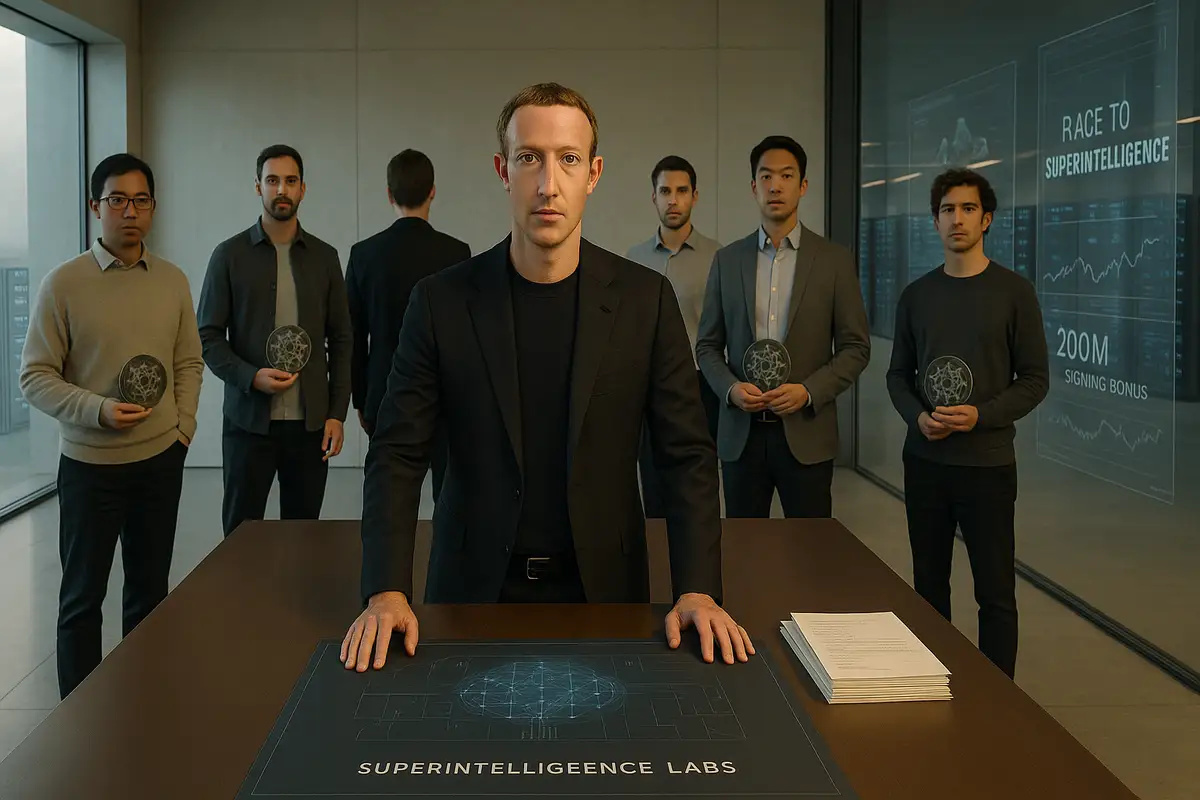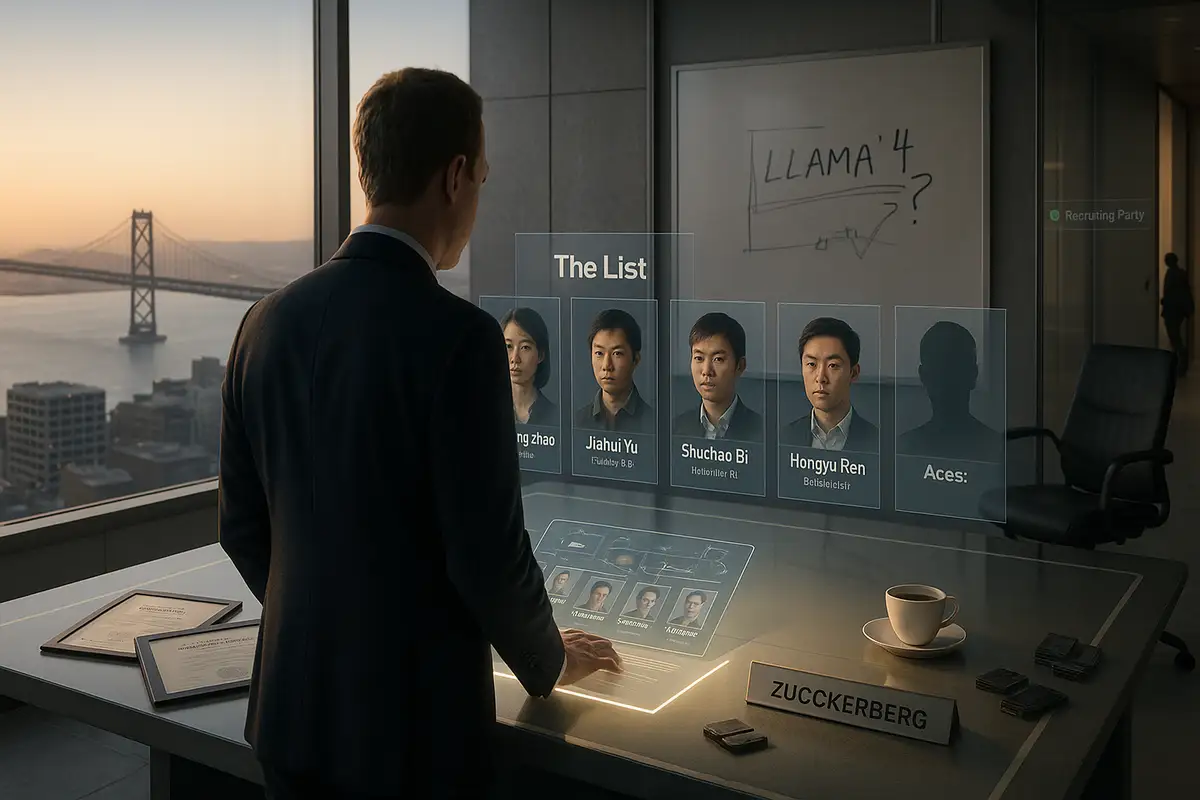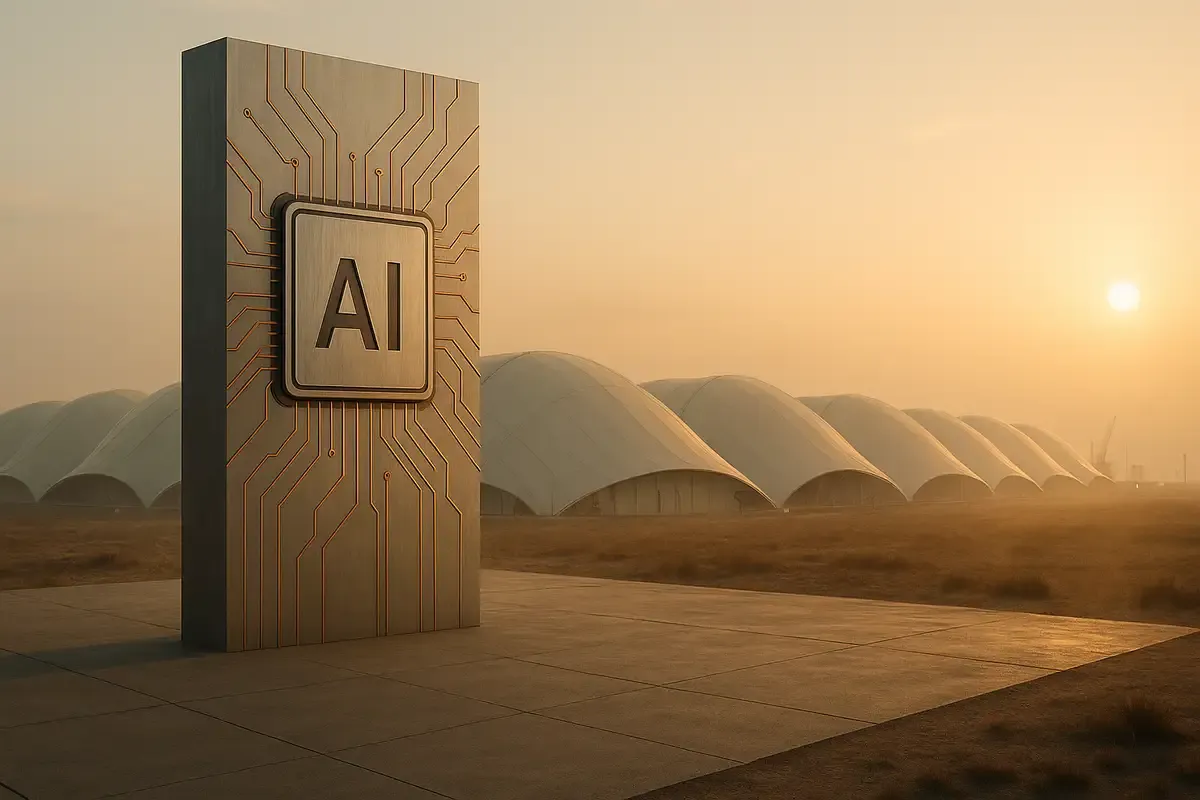💡 TL;DR - The 30 Seconds Version
👉 Meta builds data centers covering significant portions of Manhattan's footprint, with Hyperion cluster scaling to 5 gigawatts by 2030.
📊 Zuckerberg pursues "personal superintelligence" for individual needs while competitors like OpenAI focus on automating enterprise work.
🏭 First supercluster Prometheus comes online in 2026 using hurricane-proof tents instead of concrete buildings to accelerate construction.
💰 Company invested $14.3 billion in Scale AI and plans hundreds of billions more, funded entirely by existing cash flow.
🧠 Meta already sees AI systems improving Facebook algorithms autonomously, providing early glimpses of self-improving superintelligence.
🚀 Strategy assumes superintelligence arrives in 2-3 years, creating computational moats smaller competitors can't match through resource deployment.
Mark Zuckerberg just declared war on the AI establishment. In a wide-ranging interview with Jessica Lessin, Editor in Chief of The Information, the Meta CEO outlined his company's plan to dominate artificial intelligence through sheer computational force and a fundamentally different vision of what superintelligence should do.
The scale is staggering. Meta is building data centers so large they cover significant portions of Manhattan's footprint. The company's Hyperion cluster will scale to five gigawatts of power over the coming years. Its first supercluster, called Prometheus, will come online in 2026 in New Albany, Ohio, according to Reuters reporting on Zuckerberg's Monday announcement.
To speed construction, they're using hurricane-proof tents instead of traditional concrete buildings. Teams work around the clock on these "Titan" clusters, named after Zuckerberg's love of Greek and Roman mythology. The approach reflects urgency about timing in the superintelligence race.
But the strategy behind this massive buildout reveals something more interesting. While competitors like OpenAI and Google chase enterprise automation, Zuckerberg is betting on something he calls "personal superintelligence." It's a deliberate pivot away from what he sees as the industry's obsession with replacing human workers.
The Personal Touch Strategy
Zuckerberg draws a clear line between Meta's approach and everyone else's. Other labs talk about automating "all of the economically productive work in society." Meta wants to focus on relationships, culture, creativity, and having fun. The difference matters because it shapes everything from product design to business models.
"There's another side of this which is like, what are the things that people care about in their own lives?" Zuckerberg told Lessin. "Some of that is productivity. But a lot of it is relationships and culture and creativity and having fun and enjoying life."
His vision centers on AI glasses that can see what you see and hear what you hear. Imagine having a conversation where five things spark your interest, but you only follow up on one. Zuckerberg's AI would remember all five and handle the follow-ups for you. Without these glasses, he suggests, people will face a cognitive disadvantage similar to needing vision correction but not having optical glasses.
The strategy extends beyond individual productivity. Meta's AI is already showing early signs of self-improvement, enhancing Facebook's algorithms and other systems across the company without human intervention. This glimpse of recursive improvement represents a crucial step toward the superintelligence timeline Zuckerberg is racing against.
The Talent War Gets Expensive
Meta's recruitment drive has sparked headlines about compensation packages reaching nine figures. While Zuckerberg pushed back on specific numbers as inaccurate, he confirmed the market has become "quite competitive." The physics of AI development, he argues, justifies extreme spending on talent.
"You don't need a massive team to do this," Zuckerberg explained. "You actually kind of want the smallest group of people who can fit the whole thing in their head. So there's just an absolute premium for the best and most talented people."
The company has been on a hiring spree, highlighted by a $14.3 billion investment in Scale AI, according to Reuters. Meta formed Superintelligence Labs in June, led by former Scale AI CEO Alexandr Wang and ex-GitHub chief Nat Friedman.
The recruiting pitch has evolved too. Traditional tech workers wanted the biggest possible scope and responsibility. AI researchers want the opposite: the fewest people reporting to them and the most GPUs at their disposal. Meta's massive compute advantage becomes a recruiting weapon.
Starting from scratch also appeals to top talent. One researcher gave Zuckerberg an analogy about building houses: the first one you build for your enemy, the second for your friend, the third for yourself. Meta's new superintelligence lab offers that clean slate opportunity.
The Money Advantage
Zuckerberg made a point of emphasizing Meta's financial position. The company can fund its entire AI buildout from existing cash flow, without raising external capital. When pressed whether this was a dig at competitors who might need outside funding, he confirmed the advantage.
"We have a very strong business model that throws off a lot of capital," he said. The company generated nearly $165 billion in revenue last year and raised its 2025 capital expenditure to between $64 billion and $72 billion, according to Reuters.
The timing creates perfect conditions for converting capital into competitive advantage through reinforcement learning systems that improve with more computational resources. But questions remain about monetizing personal superintelligence. Meta's current advertising model funds the investment, but the future business model for AI services remains unclear.
The company's infrastructure team has innovated beyond traditional data center construction. These weatherproof tent structures can be built faster than concrete buildings while maintaining durability. The approach reflects urgency about timing in the superintelligence race.
Racing Against Unknown Deadlines
Perhaps the most revealing aspect of Zuckerberg's strategy is his timeline thinking. Nobody knows whether superintelligence will arrive in two years, five years, or seven years. But he's acting as if it could happen in two to three years.
"I just think that we should bet and act as if it's going to be ready in the next 2 to 3 years," he told Lessin. "I think that I believe that there's a shot at that. And I think if that's what you believe, then you're going to invest hundreds of billions of dollars."
This creates a fascinating dynamic. Meta is spending enormous sums on infrastructure that might not pay off if superintelligence takes longer to develop. But falling behind competitors who achieve breakthroughs first could prove catastrophic for the company's future.
The self-improvement capabilities Meta is already observing add urgency to this timeline. If AI systems can enhance themselves, the gap between current capabilities and superintelligence might close faster than expected. Meta's approach assumes this acceleration will favor companies with the most computational resources and the smallest, most talented teams.
The strategy also reflects lessons learned from Meta's previous setbacks. The company reorganized its AI efforts last month after lukewarm reception for its Llama 4 model and key staff departures. The new approach emphasizes concentrated talent over distributed teams.
Why this matters:
• Meta is weaponizing its cash flow advantage to build computational moats that smaller competitors can't match, potentially deciding the AI race through sheer resource deployment rather than technical innovation alone.
• The personal vs. enterprise AI split could fragment the industry into distinct markets, with Meta claiming the consumer space while others fight over business automation.
Read on, my dear:
- The Information: Inside Zuckerberg’s AI Playbook: Billions in Compute, a Talent Arms Race, and a New Vision for Meta
❓ Frequently Asked Questions
Q: How much energy will Meta's largest data center actually use?
A: Hyperion will scale to 5 gigawatts by 2030, enough to power roughly 3.7 million homes. For context, that's more electricity than many small countries use. A typical large data center uses about 100-200 megawatts, making Hyperion 25-50 times larger than current facilities.
Q: What exactly makes "personal superintelligence" different from ChatGPT or Google's AI?
A: Meta focuses on individual relationships, creativity, and daily life through AI glasses, while competitors target business automation. Think AI that remembers conversation details you forgot and follows up later, versus AI that writes business reports or codes software.
Q: Why use hurricane-proof tents instead of permanent buildings for data centers?
A: Speed. Traditional concrete data center construction takes 3-4 years. Meta's weatherproof tent approach cuts this timeline significantly, allowing teams to work around the clock. The tents house the actual servers and networking equipment while providing weather protection.
Q: How much are Meta's AI researchers actually getting paid?
A: Zuckerberg called reports of $100-200 million packages "inaccurate" but confirmed the market is "quite competitive." Industry sources suggest top AI talent now commands $5-50 million packages including equity, far above traditional tech salaries of $300,000-500,000.
Q: When will regular people be able to use Meta's superintelligence?
A: Meta's timeline assumes superintelligence could arrive in 2-3 years, with Prometheus coming online in 2026. However, Zuckerberg acknowledged uncertainty about whether it will take 2, 5, or 7 years. Consumer products would likely follow technical breakthroughs by 1-2 years.
Q: What went wrong with Meta's Llama 4 AI model?
A: Llama 4's April release received lukewarm response from developers, contributing to key staff departures and Meta's decision to reorganize AI efforts under Superintelligence Labs in June. The setback prompted Zuckerberg's aggressive recruitment and infrastructure push.
Q: How does Meta's AI spending compare to competitors like Google and OpenAI?
A: Meta raised 2025 capital expenditure to $64-72 billion, while Google plans $50+ billion. OpenAI relies on external funding and recently raised $6.6 billion. Meta's advantage is funding everything from existing $165 billion annual revenue without outside investors.
Q: Where exactly is Meta building these massive data centers?
A: Prometheus will be built in New Albany, Ohio, coming online in 2026. Hyperion is planned for Louisiana and should be fully operational by 2030. Meta is building multiple additional "Titan clusters" but hasn't disclosed all locations yet.












